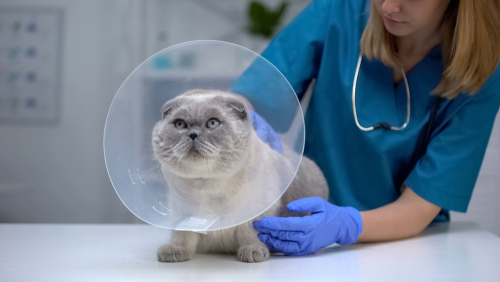
February is Spay and Neuter Awareness Month. Spaying and neutering your pets is one of the most important things you can do to keep them happy and healthy. We’re bringing you some answers to frequently asked questions around the spay and neuter process.
What is a spay or neuter?
Both are surgical procedures where the pet is put under general anesthesia. During a neuter the testicals are removed, and during a spay the female reproductive organs, including uterus and ovaries are removed.
Why is it important to spay and neuter your pets?
Spaying and neutering your pets can have numerous benefits. It reduces spraying/marking, reduces risks of certain cancers, can reduce aggression, reduces roaming for outside pets, and reduces overpopulation. Spaying can reduce the risk of uterine infections and breast cancer in your pets, while neutering can prevent the risk of testicular cancer as well as help prevent an enlarged prostate.
What age do you spay and neuter?
It can vary based on breed, which is why we want to see your pet in office before making specific timeframe recommendations. But most smaller breeds are between 6 months and a year of age, while larger breeds should typically wait until they’re at or just over a year. We typically aim to perform spay procedures before the first heat cycle, but if that is not possible, we can continue with the spay based on doctor recommendation at the appropriate time.
What should I expect after my pet’s surgery?
They’ll be a little drowsy afterwards. Like humans, some may experience anesthesia side effects such as nausea and vomiting, though it is rare. Some may also experience decreased appetite for a day or so afterwards. Expect some soreness for at least the first few days. We don’t want them running around or playing too hard for about 2 weeks after surgery, especially after a spay procedure. We always call the day after our procedures to follow up and make sure they’re doing well. Some signs of infection to look out for include major swelling, abnormal discharge, or sutures opening; if you see any of these signs please let us know as soon as possible. And yes, they must wear their surgical shirt and/or cone throughout their recovery time to allow complete and proper healing.
Booking an appointment?
If your pet has been seen within a year you may call our office to schedule a surgical appointment. Keep in mind that pets do have to be fully up-to-date on their vaccines, so they may require an appointment before their surgery to update if needed. There will be a $100 deposit at the time of booking that will go towards the procedure. Upon booking, a surgical estimate will be emailed to you.
What sets Beach Pet Hospital apart from other clinics?
We follow Gold Standard surgical practices along with state of the art equipment systems. We administer pain medications before, during, and after all procedures; as well as sending home pain medications to help with your pet’s post-op comfort. Our surgical suite allows for continuous monitoring both during and after procedures. We also offer cold laser therapy post procedure which promotes new cell growth and decreases inflammation, which results in speeding up healing time. We will also send your pet home with a surgical shirt to protect their incision while healing at home.






